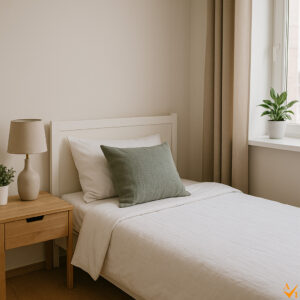Renting Spare Rooms: Pros and Cons
With the cost of living on the rise, renting out a spare room can be an appealing option. It’s a practical way to earn extra income while providing affordable accommodation. Before you open your home to a lodger, consider the advantages and drawbacks.
The Advantages
Financial gain is a major perk. The extra rent can help with mortgage payments or household bills. Thanks to the government’s Rent a Room Scheme, you can earn a certain amount tax-free each year. Additionally, it’s a smart way to utilise unused space, and for those living alone, it can offer companionship and a sense of security.
Having a lodger can also make homeownership more sustainable. If you’re away often, having someone at home can help maintain the property and deter potential break-ins.
The Drawbacks
However, sharing your home means compromising on privacy. Even the most considerate lodger will alter your daily routine. There’s a risk of late payments or property damage, and personality clashes can make living together uncomfortable.
Landlords must also be aware of their legal and safety responsibilities. Ensure the room meets health, fire, and safety standards, and have the correct agreement in place, whether it’s a lodger or licence arrangement.
The Verdict
Taking in a lodger can be rewarding and financially beneficial, but it requires clear boundaries, careful vetting, and the right paperwork. When managed properly, it can transform an unused room into a dependable income stream without turning your home into a headache.
At James Anthony, we subtly guide homeowners through these decisions, ensuring you maximise your space while maintaining harmony in your home.




